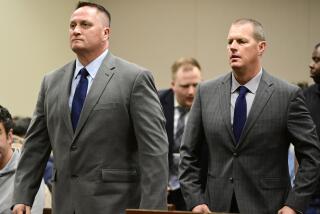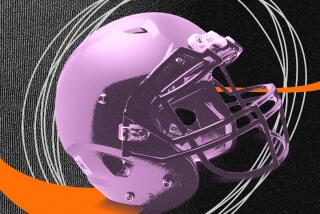Police Report: Wheeler Used Supplements
- Share via
Northwestern football player Rashidi Wheeler mixed two dietary supplements containing the banned stimulant ephedrine before collapsing and dying Aug. 3, according to a police report that quotes the team trainer who fought to save Wheeler’s life on the practice field.
The Cook County medical examiner’s office on Monday confirmed the presence of ephedrine in Wheeler’s system but said the cause of death was bronchial asthma.
“We do not think [ephedrine] contributed to his death,” Dr. Edmund Donoghue said.
But an expert on ephedra alkaloids said the presence of ephedrine and caffeine--also contained in the supplements Wheeler consumed--combined with intense exercise and possibly another stimulant contained in the player’s inhaler, could have triggered heart arrhythmia and sudden death.
“I don’t want to say the medical examiner is wrong, but I think it’s very difficult to exclude the role these dietary supplements played in [Wheeler’s death],” said Dr. Neal Benowitz, professor of medicine at UC San Francisco.
“Most people with asthma get short of breath and stop exercising. But if you have an asthma attack and keep exercising, and you have all these stimulants floating around in your system, you would be susceptible to arrhythmia.”
Wheeler, a chronic asthmatic, collapsed while running a series of sprints during preseason conditioning at Northwestern. The 22-year-old safety from Ontario was pronounced dead a short time later at Evanston Hospital.
The police report obtained by The Times, quoting team trainer Tory Aggeler, said he had been told the day of the drill that several players, Wheeler among them, were taking dietary supplements in the belief it would “enhance their performance on the field.”
Aggeler told two Evanston, Ill., detectives that Wheeler had taken Ultimate Punch and Xenadrine. Each contains ephedrine, banned by the NCAA and the International Olympic Committee.
Donoghue, the Cook County medical examiner, said the amount of ephedrine found in Wheeler’s system was “well below toxic or lethal levels.”
“We think this is a classic case of exercise-induced bronchial asthma,” Donoghue said.
Benowitz said the medical examiner’s statement is misleading because it rules out ephedrine as a contributing factor in Wheeler’s death merely because it wasn’t cited as the direct cause of death.
“They’re talking about an overdose,” Benowitz said. “It takes at least 10 times the standard dose [of ephedrine] to kill someone. . . . It’s not the same thing as talking about whether [ephedrine] contributed to the adverse effect it would have with exercise. This is a different situation.”
Benowitz, citing a study of cases reported to the U.S. Food and Drug Administration, said most people who had serious health problems after combining supplements containing ephedra alkaloids and exercise did not consume excessive doses of such products.
Donoghue and Dr. Eupil Choi, who performed the autopsy on Wheeler, could not be reached to expand on their findings.
Ultimate Punch is made by Next Nutrition Carlsbad, which also formerly made Ultimate Orange. Several Northwestern players have told The Times that others on the team, among them Wheeler, had previously ingested Ultimate Orange.
David Jenkins, president of Next Nutrition, did not return a phone call seeking comment. Next Nutrition stopped making Ultimate Orange in May. The makers of Xenadrine could not be reached for comment.
Like Ultimate Orange, Ultimate Punch is still for sale at health and nutrition shops nationwide. Xenadrine is widely available.
The police report said Aggeler “obtained the supplements belonging to the victim from an unknown player” and gave them to police.
The report also adds details about the scene on the lakefront practice field where Wheeler collapsed--a scene players have described as “chaos.”
Wheeler’s mother, Linda Will, arrived Monday night in Chicago, where she is scheduled to meet today with her attorney, Jim Montgomery. Will has said Northwestern wasn’t prepared to deal with her son’s emergency and has enlisted the help of the Rev. Jesse Jackson and attorney Johnnie Cochran Jr.
Jackson, when asked Monday if the presence of ephedrine in Wheeler’s system raised concerns of the supplement contributing to the player’s death, said, “No, it does not. This death was not due to a foreign substance. The report does not suggest a heart reaction.
“The idea we’re getting at is that even if this was an extreme case [of supplement use] or if it was just a violent collision between players, this happened on campus, under the supervision of some, but there was not enough support in place.”
Will has said Aggeler, four assistant trainers, one student trainer and strength coach Larry Lilja were monitoring the drill. Coach Randy Walker, who was prohibited by NCAA rules from attending the summer conditioning drill, said it was six trainers, Lilja and another strength coach.
“In this case, you had an unauthorized, illegal official practice where there were two major things missing: the head coach and the proper medical equipment,” said Jackson, who said he is scheduled to meet today with Northwestern President Henry S. Bienen.
“What this report and what the video of the practice verify is that there was no proper infrastructure in place. This is so basic. It was not the drill that killed Rashidi, per se. It was not having the proper equipment in place to handle his exhaustion.”
After collapsing near the end of the series of 28 sprints--ranging from 100 to 40 yards--Wheeler at first seemed to be hyperventilating and was given a bag to breathe in, according to the report.
Wheeler’s breathing seemed to slow down, Aggeler told detectives, and so the player was left with an intern on the medical training staff, Michael Rose. Shortly thereafter, however, Rose called for Aggeler because Wheeler “became unresponsive and seized.”
Aggeler told police he began CPR. He tried to use the field call box to dial 911 but the phone didn’t work. Then he used a player’s cellular phone to call paramedics.
Rose said Wheeler “seized up and his eyes opened with a glaze look.” Then Wheeler bit his tongue and “there was blood in his mouth.”
Before becoming unconscious, Rose told police, Wheeler was seen taking “one puff from the [asthma] inhaler.”
Rose also identified three other players who collapsed and told detectives it is believed these players were also taking dietary supplements.
Neither Rose nor Aggeler could be reached Monday for comment.
Northwestern has begun an investigation into the circumstances of Wheeler’s death. Spokesman Chuck Loebbaka declined to comment.
More to Read
Go beyond the scoreboard
Get the latest on L.A.'s teams in the daily Sports Report newsletter.
You may occasionally receive promotional content from the Los Angeles Times.











